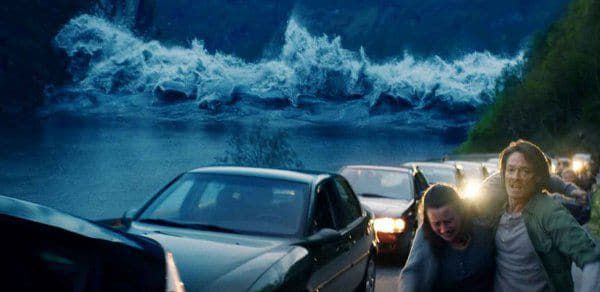Eye For Film >> Movies >> The Wave (2015) Film Review

When we think of tsunami, we tend to think of Japan of the Indian Ocean - perhaps, if we've been paying attention to recent studies, to the Canary Islands. But there was once a tsunami that devastated Britain, and it came from Norway. With 53,199km of coastline (including all those fjords), and with a high proportion of its mountainsides geologically unstable (a growing problem due to climate change), Norway actually faces a significant tsunami risk. Alert to this, its government has established a network of early warning stations in vulnerable areas. The Wave imagines what might happen if the warnings weren't sounded fast enough.
Kristian (Kristoffer Joner) is a geologist. For several years, it has been his job to monitor the condition of the mountains around Geiranger fjord, but now he is leaving for a more profitable position in the oil industry. All the furniture from the house his family loves is being packed away. Teenage son Sondre (Jonas Hoff Oftebro) is already homesick; small daughter Julia (Edith Haagenrud-Sande) is worried about her parents' marriage. Their mother, Idun (Ane Dahl Torp, on top form) goes to work in the local hotel. She and Kristian have argued, but he assures Julia that things will be okay.

Every time we enter a building, we are told how many metres above sea level it is.
When Kristian notices a couple of odd readings on the instrument monitors in the early warning station, he doesn't want to leave. Something is wrong; he can feel it. This isn't Hollywood-style mysticism. We see the little things that are triggering his instincts. His gaze lingers on a shallow patch of water at the fjord's edge. Water dripping down a cliff catches his eye. Arguments ensue in the office. Though it's never stated, smart viewers will understand that they cannot risk sounding false alarms because that might lead to people ignoring a real emergency. Again unlike in Hollywood disaster movies, we hear real geological theories expounded by actors who convince as people capable of understanding them. Testing them requires a descent into a narrow chasm, which cranks up the tension, and The Wave starts making geology seem as thrilling as archaeology did after Raiders Of The Lost Ark.
We know the wave is coming, of course. We're waiting for the pay-off. But this film gets us involved right from the start, and by the time it hits, the emotional impact is far greater than we might have anticipated.
Then there are the special effects. This is a film that should be watched on as big a screen as possible, but even on a smaller one, the tsunami is stunning. Part of this is due to clever direction. Throughout, the film uses little visual tricks to make its £4.5m budget go further, from mist to obscure the apparent lowering of the water level to long, low shots that give us a subconscious map of the town and highlight its vulnerabilities. When we first see the wave, it's at a distance, but we've been fed enough information to recognise immediately that it's huge. Rather than just seeing its height, we see its bulk as it moves along the fjord; we understand its power. By the time it begins to fill up the screen, it is truly terrifying.
Wisely, director Roar Uthaug doesn't indulge himself in the aftermath. We see only what key characters see. Each dead body, then, is a shock; if there were hundreds on screen it would be harder to feel that. Characters behave in realistic but refreshingly practical ways, and demonstrate enough knowledge and skill that their mistakes seem more natural. Only briefly do we stray into existential angst. the characters don't have time for it; they're focused on survival.
There are a few things about the film that don't quite gel, like the fact that everyone seems immune to hypothermia, but for the most part it's scientifically astute and very grounded. Bit part characters are developed sparingly yet efficiently, with Eili Harboe standing out as Idun's assistant. Towards the end it gets a little too sentimental but this is a minor quibble. Uthaug has ably demonstrated that one doesn't need a blockbuster budget to make a world class action film, and that the potential of the new Scandinavian cinema extends far beyond noir.
Reviewed on: 06 Aug 2016















